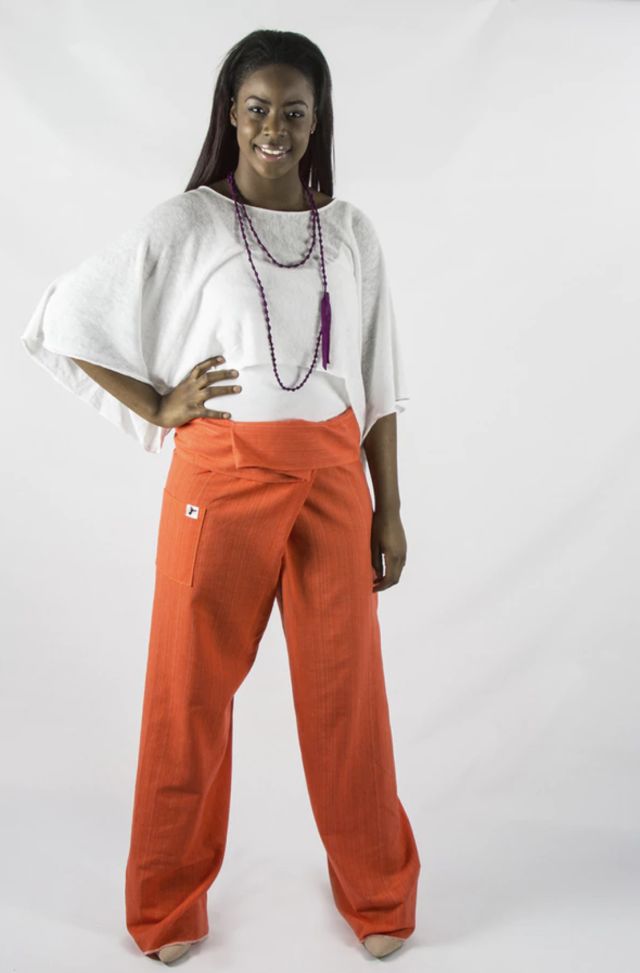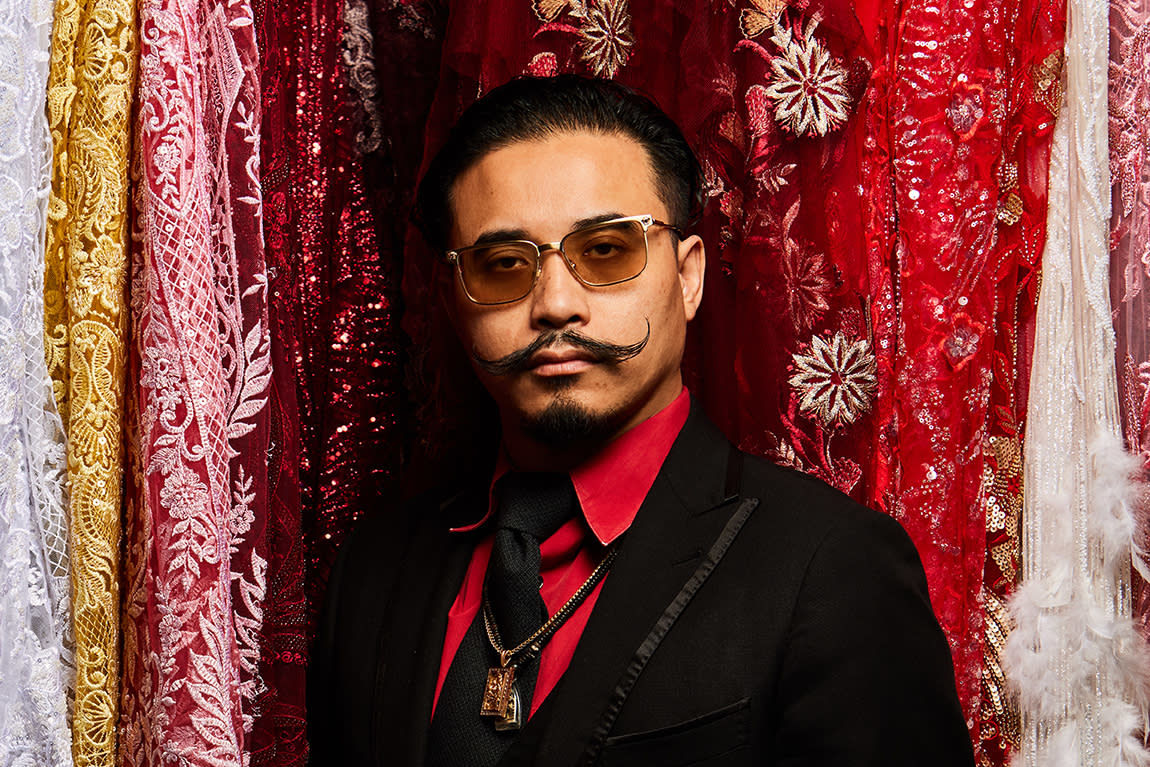How One Pair of Pants Is Changing the World
It all started with a pair of (really comfortable) pants.
Living in Asia between the ‘90s and 2000s, Dawn Manske—an American teaching English at an international school in China—fell in love with a Thai garment called fisherman pants. Lightweight, unisex trousers, the pants are one-size-fits-most with wrappable ribbons that tie around the waist and are traditionally worn by—you guessed it—fishermen in Thailand.
Manske had a few pairs but couldn’t find the pants anywhere upon her return to the U.S., so she asked her friend—who, at that point, was teaching in Thailand—to bring her some more. The friend did, giving Manske her highly coveted fisherman pants as a wedding gift.
Manske wore said pants to the airport the next day when she and her husband left for their honeymoon. A TSA agent complimented them. So did a flight attendant. So did a woman who chased Manske through a parking lot to inquire where she’d gotten them.

Made for Freedom's CREABELI pants, ethically made in Thailand and modeled after traditional Thai fisherman pants.
Image: Courtesy of Made for Freedom
“I got so many compliments on these silly pants,” Manske said. “I cannot tell you how many times someone would come along and say, ‘oh, I really like your pants.’”
The pants, though, weren’t the only thing she’d discovered living in Asia. In Beijing, Manske was first confronted with the devastating reality of human trafficking.
The streets there were filled with begging children who Manske learned were often sold by their desperate parents out of impoverished villages around the country. Aside from extreme poverty, Manske found the trafficking industry also fueled by “devaluation of the girl-child,” she said.
The International Labour Organization estimates nearly 21 million people are trafficked globally (though other estimates range as high as 37 million), resulting in $150.2 billion in illegal profits each year. Two-thirds of that profit—roughly $99 billion—comes from sexual exploitation, which overwhelmingly victimizes women. Profits are the highest in Asia, the Human Trafficking Center reports, where the most victims are located; according to the ILO, a quarter of the victims are children.
That “ripped my heart out,” Manske said, especially after a video compounded everything she’d started to learn. It showed an undercover reporter in Cambodia encountering a 6- or 7-year-old trafficked girl offering oral sex to foreigners for $10.
“At that point, I realized this is much bigger than the problem I saw in China,” Manske said. “This is a global issue, and this is so much darker and deeper than I realized. It really weighed on me for several years.”
She thought about her pants, and she thought about another wedding gift—a pair of sandals that were the product of a social enterprise, a business that employed vulnerable women escaping difficult situations by teaching them marketable skills and paying fair wages.
“At that point, I was like, 'hey, I’ve seen this example of a business that helps people. I know the people I would like to help in this world, and there are some people that really like these pants,'” Manske said. “Could these pants be the foundation of a business that could help people?”
They were, and Manske got her first order of pants in 2014 from a center in northern Thailand that helped minority women who were victims of or vulnerable to exploitation. There, women learned to sew, making a version of the fisherman pants Manske redesigned with a more flattering, less baggy backside. She gave her new pants a new name, too: CREABELI, an amalgam of four other words, “create a beautiful life.”
Manske launched her own social enterprise, Made for Freedom, which today partners with 15 centers around the world to provide dignified employment to vulnerable women, who also receive an additional 20 percent of proceeds from CREABELI products. Beyond pants, Made for Freedom sells bags, T-shirts, jewelry, and yoga accessories.
Women’s centers began contacting Manske after hearing about her mission, and she visited cities all over the world to engage more suppliers. Partners in St. Louis (where Manske is based), Haiti, Ghana, Uganda, Nepal, China, Vietnam, Cambodia, and Thailand train and employ women rescued from red light districts, fleeing domestic violence, struggling as single mothers, or escaping forced prostitution.
“What we’re trying to do is not convert everyone to love these pants. What we’re trying to do is provide dignified employment,” Manske said. “Whether it’s the T-shirts or the pants or the necklace or the scarf, the pieces that we have are unique, and the person wearing it becomes the advocate.”
Made for Freedom sells products through its e-commerce website, and Manske also travels with her wares–this week, she’s in Houston, the site of the three-day 23rd annual Texas Campus Crime Stoppers Conference.
Of the estimated 21 million people enslaved in human trafficking worldwide, 313,000 are believed to live in Texas, according to research from the University of Texas. Houston’s huge, diverse population coupled with its status as a major transportation hub with international highways, airports, shipping ports, and proximity (and accessibility) to Mexico makes the city ripe for the crime, United Against Human Trafficking says.
The same can be said of other cities across the nation, as human trafficking hits closer to home than most would ever expect. Once, at a conference, a neighboring vendor studied Manske’s booth–particularly her sign reading, “fight human trafficking with style.”
“She just broke down, because her mother had sold her,” Manske said. “She was like, ‘thank you so much for doing this. This is so much more powerful than you understand.’”
When they learn about Made for Freedom, most people immediately want to help, Manske said, be it by purchasing a necklace or selling the products at their own boutiques or on college campuses–both programs she’s developing through her initiative, DEEP Fashion (Dignified Employment Empowers and Protects).
Today, Manske smiles when complimented on the pants that started it all.
“Let me tell you about my pants,” she says.
Find Made for Freedom products online or at the Texas Campus Crime Stoppers Conference from 8:30–5 p.m. on Tuesday, February 27 at the Omni Hotel at Westside, 13210 Katy Fwy.




